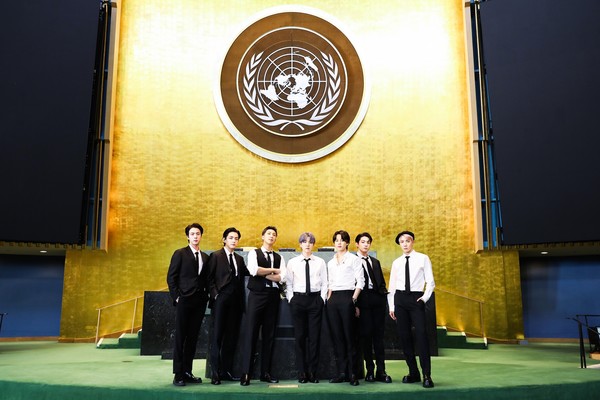The K-pop boy band BTS attended the 76th United Nations (UN) General Assembly on September 20, representing South Korea as the Special Presidential Envoys for Future Generations and Culture. The band gave a speech during the Sustainable Development Goal (SDG) Moment, which stands as a platform for world representatives to discuss plans of actions required to alleviate COVID-19 and contribute to a global effort in achieving the SDGs.

This is BTS’s third appearance at the UN, following their first speech in 2018 and a short clip that was presented in the virtually held 75th General Assembly in 2020. The first speech put forward a powerful message urging youth to love themselves and “speak themselves”. This year, their speech shared stories of how the members’ lives were disrupted by the pandemic, ending with an optimistic message which doubles one of their song titles: “Life Goes On”.
BTS touched on two major topics: COVID-19 and climate change. The speech opened with recognizing the frustration and disappointment due to the prolonged pandemic, mentioning the canceled graduation ceremonies and their concert tours. It then transitioned into emphasizing the severity of environmental destruction and the necessity of coming up with an effective solution. As representatives of youth worldwide, their speech also included issues adolescents and young adults are currently facing — from daily struggles of taking online classes and interacting with friends to voicing concerns about relevant global issues such as climate change.
The speech portrayed a significant message of hope and courage targeted toward the younger generation. RM, the leader of BTS, said that people in their teens and twenties are being referred to as “COVID’s lost generation,” since the older generations fail to see the paths the younger generation are treading. However, BTS claimed that the appropriate label should be the “Welcome generation”, which signifies an attitude of welcoming change rather than fearing it and continuing to forge ahead despite impediments. This shift in viewpoint is an example of positive reframing. Despite a negative or challenging situation, the speech motivates the current generation to think in a more positive light: to find lessons to be learned and think about upsides to a seemingly hopeless situation. BTS’s continued message of hope and positivity resonates with the young audience, the generation which constitutes the majority of the BTS’s fanbase, ARMY.
Other than the powerful message of the speeches, it is worth noting the significant impact the K-pop icon has brought to diplomacy and international relations. The seven-minute speech was viewed by more than one million fans live, and the clip shared via UN’s official Youtube channel recorded over 6.5 million views. These views reflect the group’s massive influence on a global audience. The ability to spread positive influence was already proven through the “love myself” campaign launched in 2017 by UNICEF in partnership with BTS to eradicate violence against children and teenagers and promote their well-being. BTS became the first artist in Korea to raise funds for a global campaign and donate part of their album sales for a social cause. This influence is expected to extend limitlessly, with the continuously expanding K-pop industry and a consequently growing cultural appeal. The Blue House announced that BTS will catalyze global cooperation to solve issues such as inequality, diversity, and poverty, reiterating the potential the group holds in acting as a source of soft power in international relations.
The extent to which BTS can act as “civilian diplomats” and contribute to solving practical global issues remains to be seen. However, the K-pop band’s unprecedented popularity has already demonstrated the tremendous appeal and influence of K-pop culture on a diverse audience, which can be utilized for greater purpose of promoting sociopolitical values.

